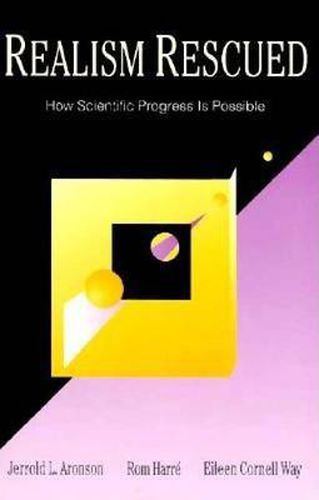Readings Newsletter
Become a Readings Member to make your shopping experience even easier.
Sign in or sign up for free!
You’re not far away from qualifying for FREE standard shipping within Australia
You’ve qualified for FREE standard shipping within Australia
The cart is loading…






Does science give us a progressively more accurate and objective account of the world? This book by three leading philosophers of science presents a new defense of scientific realism against skeptical and positivist attacks. While positivists view scientific theories as devices for predicting observable phenomena, realists maintain that theories describe hidden processes which account for observable phenomena. This problem raises the question: What are scientific theories about? Do they refer to an unobservable yet real realm of physical processes? It seems undeniable that the scientific endeavor has in some sense made progress. But is the increasing practical success of the physical sciences good grounds for believing that their theories and techniques lead us nearer to the truth? According to Aronson, Harre, and Way, past failures to answer these questions have been due in large part to the assumption that knowledge is expressed in propositions and organized by the canons of logic. On the assumption that science must meet the world in a correspondence between statements and states of affairs, realism turns out to be difficult to defend. Realism Rescued offers a new direction, relying on the importance of models in scientific work. Theories are not to be thought of as sets of propositions, though they can be expressed propositionally. Rather they are models, chunks of orderings of natural kinds. For the first time, the indispensability of models is turned into a powerful argument for realism, an argument that confronts the skeptic on his own ground. By drawing on a new technique of knowledge representation developed in Artificial Intelligence, the dynamic type-hierarchy, the authorsgive a convincing account of the central role of models. Such concepts as verisimilitude, natural kind, natural necessity, and natural law can then be presented far more clearly than ever before.
$9.00 standard shipping within Australia
FREE standard shipping within Australia for orders over $100.00
Express & International shipping calculated at checkout
Does science give us a progressively more accurate and objective account of the world? This book by three leading philosophers of science presents a new defense of scientific realism against skeptical and positivist attacks. While positivists view scientific theories as devices for predicting observable phenomena, realists maintain that theories describe hidden processes which account for observable phenomena. This problem raises the question: What are scientific theories about? Do they refer to an unobservable yet real realm of physical processes? It seems undeniable that the scientific endeavor has in some sense made progress. But is the increasing practical success of the physical sciences good grounds for believing that their theories and techniques lead us nearer to the truth? According to Aronson, Harre, and Way, past failures to answer these questions have been due in large part to the assumption that knowledge is expressed in propositions and organized by the canons of logic. On the assumption that science must meet the world in a correspondence between statements and states of affairs, realism turns out to be difficult to defend. Realism Rescued offers a new direction, relying on the importance of models in scientific work. Theories are not to be thought of as sets of propositions, though they can be expressed propositionally. Rather they are models, chunks of orderings of natural kinds. For the first time, the indispensability of models is turned into a powerful argument for realism, an argument that confronts the skeptic on his own ground. By drawing on a new technique of knowledge representation developed in Artificial Intelligence, the dynamic type-hierarchy, the authorsgive a convincing account of the central role of models. Such concepts as verisimilitude, natural kind, natural necessity, and natural law can then be presented far more clearly than ever before.